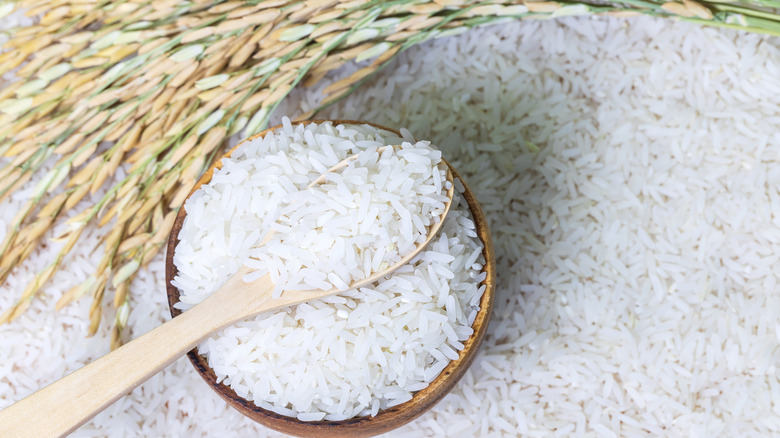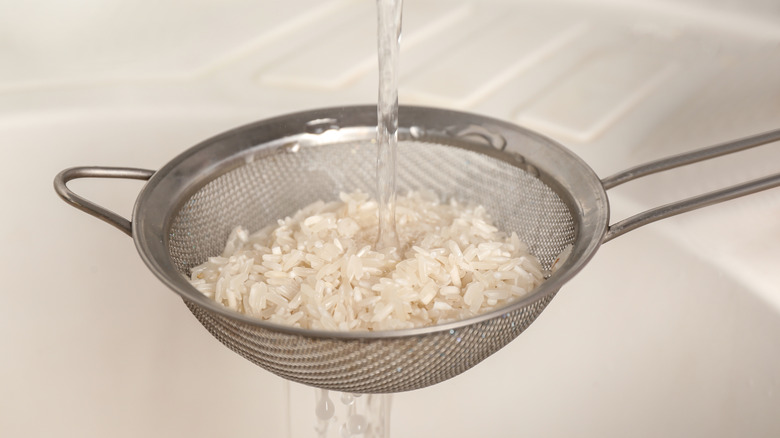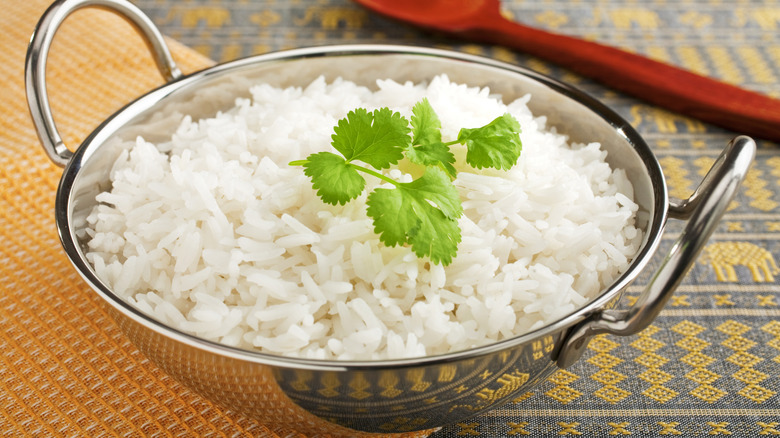Why It's Important To Rinse Rice Before Cooking It
Like the other members of the carbohydrate trifecta (pasta and potatoes) rice is an easy-to-prepare staple that any home cook can probably make with their eyes closed. "Two parts water to one part rice" is as ingrained in your mind as your own phone number. There is, however, one rule to cooking rice that you never really understood, and rarely adhere to. Always rinse your rice before cooking it.
America's Test Kitchen suggests pouring the grains into a "colander or mesh sieve" and rinsing under cold water until the water runs clear (roughly two minutes). The Washington Post introduces a second method, suggesting that you put your rice in a bowl, cover it completely with water, churn it lightly with your fingers, and pour the water out. This should be done until the water is clear. And MasterClass reveals that the grains used for risotto and rice puddings don't require the water to run clear as they only need a rinse to wash away dust.
Yes, you've seen variations of these directions before, but most of the time your rice goes unrinsed. Perhaps, if you knew why it's important to include this step in your rice preparation, you'd feel differently. Here's why you should always rinse your rice.
Rinsing removes debris from your rice
So, what is it about rice that necessitates its need to be bathed before cooking? Unlike your potatoes and pasta, your rice has likely taken a trek from faraway corners of the globe to make it to your kitchen cupboard. The Washington Post explains that during these travels, the tiny grains rub against one another creating a dusty jacket around each granule. This is starch and, if not removed, it will transform your grains of rice into a gluey, clumpy mess. But that's not the only reason.
Martha Stewart contends that rice's lengthy journey can also lead to it picking up "dirt, dust, debris, chemicals, and bugs" — things that you'll definitely want to get rid of before prepping your favorite paella or pilaf. Sometimes, the manufacturing process, itself, can introduce undesirable things. But when it comes to a stray insect, it doesn't really matter where it came from. The important thing is that it is removed. MasterClass introduces a third argument for rinsing your rice. They reveal that by rehydrating the grains, you are actually "kickstarting the cooking process."
Okay, so rinsing rice makes sense in theory, but does it really make a noticeable difference? Will rinsing offer up perfect rice every time?
Rinsing leads to fluffier rice
Apparently, rinsing the grains is a key secret to making perfect rice. One writer at The Kitchn confessed to skipping the rinsing process in the past, but after one too many dishes of "gummy rice" that "clumped together," she decided to give this step a try. What were her results? She pulled off a pot of rice that was "fluffy and far less likely to clump." Yes, the simple act of rinsing can completely transform your final product. But, wait. There's more. The Guardian warns that a failure to rinse your rice could leave your rice with an unpleasant odor and result in it going bad much quicker. If you were planning on leftovers for a few days, you may be out of luck.
Inverse purports that rinsing can also help remove heavy metals from your rice that get there when rice paddies are compromised by contaminated groundwater. They reveal that a 2018 "Journal of the Science of Food and Agriculture" study showed that rinsing "significantly reduced concentrations." Rinsing yields yet another impressive result.
Clearly, if you prefer your rice to be free of clumps, detritus, and strange odors (and who doesn't?), including the rinsing step is well worth the effort. If you want to test this theory, try out your favorite recipe with rice for a delicious, hearty dinner.


